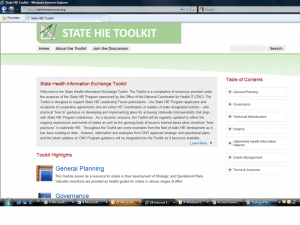ONC’s State HIE Toolkit: “Execution: The Discipline of Getting Things Done”
For the Office of National Coordinator for Health IT, 2010 and the ONC’s State HIE Toolkit are about “getting things done’” to quote the title of Larry Bossidy’s and Ram Charan’s 2002 business classic “Execution: The Discipline of Getting Things Done.”
National Coordinator for Health IT Dr. David Blumenthal spoke with reporters in a March 15, 2010 conference call about the final round of awards of State HIE Cooperative Agreements to 16 remaining states, and said “As part of the grants, the Office of the National Coordinator for Health IT will give states guidance and technical assistance, essentially working ‘side by side with the states, looking at their plans and helping them to design and implement them,’” which was reported by Mary Mosquera of Government HealthIT. The State HIE Toolkit developed by AHIMA under the direction of ONC is part of the “side by side” relationship to which Blumenthal referred.
Excerpts from the State HIE Toolkit as of March 16, 2010:
http://statehieresources.org
“Welcome to the State Health Information Exchange Toolkit. The Toolkit is a compilation of resources provided under the auspices of the State HIE Program sponsored by the Office of the National Coordinator for Health IT (ONC). The Toolkit is designed to support State HIE Leadership Forum participants – the State HIE Program applicants and recipients of cooperative agreements who are either HIT Coordinators or leaders of state designated entities – with practical “how to” guidance on developing and implementing plans for achieving statewide Interoperability that align with State HIE Program milestones.
“As a dynamic resource, the Toolkit will be regularly updated to reflect the ongoing experiences and needs of states as well as the growing body of lessons learned about what constitute “best practices” in statewide HIE. Throughout the Toolkit are some examples from the field of state HIE development as it has been evolving to date. However, information and examples from ONC approved strategic and operational plans and the latest updates on ONC Program guidance will be integrated into the Toolkit as it becomes available.” http://statehieresources.org
About the State HIE Toolkit
“The Toolkit addresses the five essential domains (i.e. governance, finance, technical infrastructure, business operations, and legal/policy) and also offers information related to general planning, grant management and other cross-cutting areas such as coordination with federal programs.”
Toolkit Content Development
“Contributors to the Toolkit content include a collaborative team of experts with experience in the field, led by staff from the ONC funded State-level Consensus Project (SLHIE Project).
“The Toolkit is inherently a “work in progress”, designed to be regularly updated to reflect the ongoing experiences and needs of states as well as the growing body of lessons learned about what constitute “best practices” in statewide planning and implementation.
•Throughout the Toolkit are some examples from the field of state development as it has been evolving to date.
•However, as it becomes available, information and examples from approved strategic and operational plans will be integrated into the Toolkit.
•The Toolkit will continue to link to relevant Program documents as information becomes available from the Office of the National Coordinator (ONC).”
Toolkit Organization & Updates
“The number of Toolkit modules will be expanded and all of the modules will be updated on a regular basis as additional information becomes available. Subscribe to the State Forum listserv and check back often to get the most up to date information, examples and tools.”
Toolkit v1 – Planning Fundamentals – December 2009 Release
Includes Modules:
Planning Overview
Governance
Finance
Technical Infrastructure
Nationwide Health Information Network
Grants Management
Toolkit v2 – Additional Modules – Early 2010 Release
Includes Modules:
Business Operations
Technical Operations
Legal/Policy
Privacy and Security
Program Coordination and Leverage
Guidance on Meaningful Use
Module Content and Structure
“Each module of the Toolkit contains a variety of information designed to foster learning on the topic and support states making design decisions and carrying out implementation approaches. Each Module is structured to include:
•Overview information about the topic
•Frequently Asked Questions (FAQ’s), updated regularly in response to states’ issues and inquiries
•Resources, including reference materials, tools and other decision supports
•Case Studies and Examples
•Links to Federal Program documents and guidance released by ONC and other agencies”


